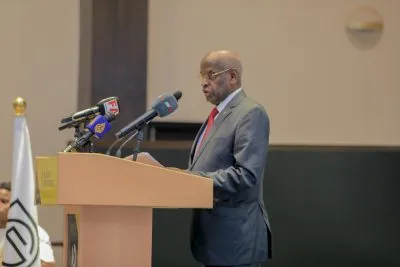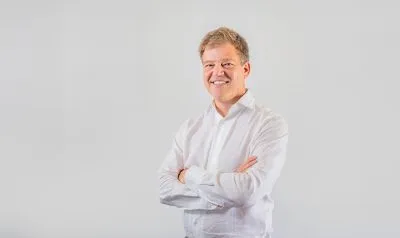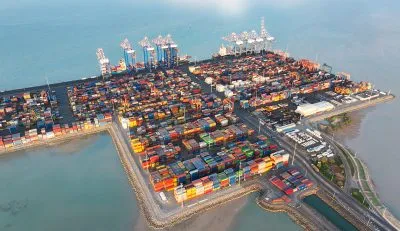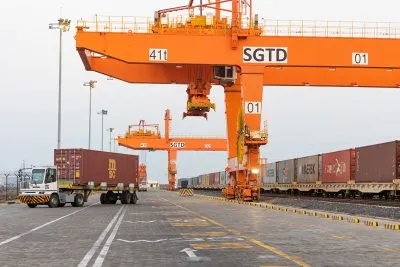The former UMP MP, Youssouf Moussa Dawaleh, a soft-spoken and elegantly dressed man, is a businessperson in construction and real estate. He welcomed us to his office in Djibouti city centre, where he explained that by focusing on the development of tourism, continuing to invest in renewable energy – to eventually reduce the cost of electricity – and allowing for more domestic processing businesses, the country could, in his view, make huge strides.
African Business: The Sovereign Wealth Fund of Djibouti is organising an economic forum in mid-May. What do you think of this initiative?
Youssouf Moussa Dawaleh: I think it’s a good thing to organise a big event to showcase Djibouti’s economic potential. The aim is to attract foreign direct investors to our country. As for the Sovereign Wealth Fund, it’s a very young but dynamic institution that’s starting to make a name for itself in the region. Thanks to its activities, delegations regularly come to Djibouti. There are projects in the pipeline and others that are in the early stages of implementation.
In your opinion, what sectors could boost Djibouti’s economy?
Youssouf Moussa Dawaleh: I regularly think of tourism, a major investment lever that could be much more developed. Djibouti could also benefit from the renewable energy sector, to lower the cost of energy, and thus encourage the creation of industries and small and medium-sized enterprises.
Finally, there is a great deal of potential in the processing industry. The country can be a redistribution platform for the region, particularly in food products. I’m thinking of sugar and other products that could be stored here. We have free trade zones that can accommodate small factories, with tax advantages. But to do that, we need to reduce the energy bill. I believe in these three pillars of development, with the support of various international partners.
What has the country done to achieve energy self-sufficiency?
Youssouf Moussa Dawaleh: A wind power project is already up and running, which bodes well for the future, and it’s only a matter of time before a second one is set up. The government has also launched solar energy projects. Together, these two initiatives could enable Djibouti to move closer to energy autonomy, and thus become less dependent on Ethiopia, which supplies us with electricity. There is also geothermal energy, which could yield good results. I think that foreign investors will have something to gain in this sector. In any case, if the price of electricity falls, it could encourage many Djiboutian operators to create small processing industries, and thus create jobs, to reduce the unemployment rate in the country.
How can cooperation between local SMEs and foreign investors be strengthened?
Youssouf Moussa Dawaleh: Ideally, there should be a cascade of wealth redistribution. Unfortunately, in certain areas, we have not yet seen sufficient spin-offs. In any case, there needs to be synergy in the work done.
You’ve had a long career, particularly in the construction and real estate sectors. Who are the major economic operators in the region?
Youssouf Moussa Dawaleh: There are a number of family businesses that have grown from generation to generation, such as the Coubèche family in retail and industry, the Marill group in car distribution, and the Kamaj Group in real estate and hotels. There are also young people who have achieved industrial success, such as in organic mineral water. To create new national champions, I think we need to encourage young people to take risks and invest. We need to give them a chance.
Some entrepreneurs speak of Djibouti as a virgin country where much remains to be built. What are your thoughts on this?
Youssouf Moussa Dawaleh: Djibouti has a lot of potential, but has not yet reached maturity, particularly in terms of direct investment. So, yes, the port infrastructure is of a very high quality, and the government has invested heavily in digital technology via undersea cables, but industry and the private sector are struggling to keep up, not least because of the cost of energy. We have a lot of work to do to change that dimension.
Is access to employment one of the main challenges facing Djibouti?
Youssouf Moussa Dawaleh: Yes, because youth unemployment is around 43%. There aren’t enough jobs to keep up with the number of young people graduating from university or technical colleges. This is not just a Djibouti problem, it’s an African problem, if not a global one. I’d like to come back to the importance of lowering the cost of energy, to enable these young people to become entrepreneurs. The government can also support them in terms of taxation. This would be very useful for the country’s development.
Djibouti’s GDP is 70% dependent on the port sector and related services. How can the country’s economy be better diversified?
Youssouf Moussa Dawaleh: Djibouti is Ethiopia’s natural outlet, so we have developed infrastructure dedicated to maritime and port activities. We have also developed associated services, such as transhipment activities. We are now working on diversifying our economy, whether in the digital sector or in banking, which is based on the stability of our currency. Our country has many advantages that should not be overlooked. The Sovereign Wealth Fund must play a role in this diversification, by attracting investment in different spheres, so that we are not just dependent on our port activities.
A number of investors will be visiting Djibouti as part of the Djibouti Forum in May. What makes your country so special?
Youssouf Moussa Dawaleh: Our great advantage is our geographical position. Djiboutians are part-Arab, part-African, [also] part-European, and we have a rich cultural heritage. And we’re the only French-speaking country in the whole region. Djibouti is also a haven of peace, where you can move around freely at any time of night. Last but not least, we enjoy a high degree of religious tolerance, and are open to the world. It should also be noted that Djiboutians are very home-loving. They return home after completing their studies abroad, and they are very attached to their nation. It’s important to know all this to understand our country better.
Want to continue reading? Subscribe today.
You've read all your free articles for this month! Subscribe now to enjoy full access to our content.
Digital Monthly
£8.00 / month
Receive full unlimited access to our articles, opinions, podcasts and more.
Digital Yearly
£70.00 / year
Our best value offer - save £26 and gain access to all of our digital content for an entire year!

 Sign in with Google
Sign in with Google 



